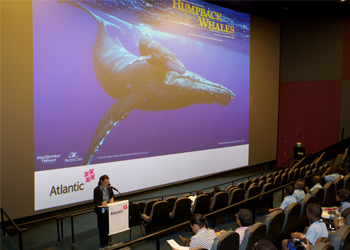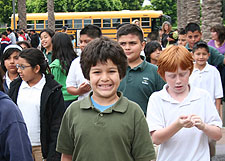Education & Change
We’re changing the planet, one film at a time.
We don’t just tell people why they should care, we show them, harnessing the power of great storytelling and stunning imagery to spark lasting changes in behaviors and attitudes.
- Ocean charities like Reef Check and other NGOs used screenings of Coral Reef Adventure to raise more than $250,000 for coral reef conservation
- After seeing To the Arctic, 86% of the audience said it would impact their vote on environmental issues
- Our Mission Aquarius campaign created international media attention, which helped drive new funding to keep the world’s last remaining underwater research station from closing
We have seen countless examples of this positive social change at work, whether through a giant-screen film, digital video series or social media campaign.
Our work influences the way people think, feel and act.
Data based on Edumetrics studies and evaluations, conducted in years from 1998-2008.
The reach of our films is vast and powerful.
Our films play in the world’s most renowned science centers, natural history museums, space centers and aquariums. These informal learning settings are critical to our mission of entertaining and educating audiences.
One in three Americans has seen a giant-screen film and 96% would recommend the experience to a friend.
Over 60% of giant-screen theatres are in prestigious museums and science centers in metropolitan areas. The films reach a youthful, active audience, 2/3 of which have a college degree or higher.
850 million people pass through museums each and every year, more than all professional sporting events combined.
(American Association of Museums Study, 2001)
77% of viewers come to IMAX theatres to be both educated and entertained.
Nearly 50% of the public’s understanding of science outside of school comes from the free-choice learning sector dominated by museums.
(2002 study by Dr. John H. Falk)
87% of Americans believe museums to be among the most trustworthy sources for information.
(American Association of Museums Study, 2001)
Almost 75% of informal learning institutions provide programs, workshops, materials, or curricula support for K-12 science education, in addition to one-day field trips.
(Center for Informal Science Institutions, 2004)
Estimates are that science institutions serve 62 percent of the total schools in the United States, impacting 9,000 districts, 73,000 schools, 2 million teachers, and 36 million students.
(Center for Informal Science Institutions, 2004)
Our work is of the highest educational quality.
We seek to present science concepts in an entertaining and engaging way, while remaining steadfastly committed to scientific accuracy.
Our films are paired with award-winning educational programs.
To extend the impact of our films, we design educational outreach programs that expand on the themes and issues presented in each film. We hope to pique interest in science, the environment and world culture—inspiring new attitudes and positive action.
Backed by a strong foundation.
The MacGillivray Freeman Films Educational Foundation supports our mission of education and change.

















